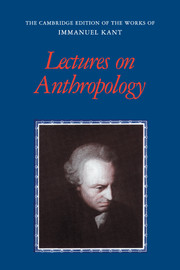Book contents
- Frontmatter
- Contents
- General editors’ preface
- Preface
- Abbreviations
- General introduction
- Anthropology Collins 1772–1773
- Anthropology Parow 1772–1773
- Anthropology Friedländer 1775–1776
- Anthropology Pillau 1777–1778
- Menschenkunde (1781–1782?)
- Anthropology Mrongovius (1784–1785)
- Translator's introduction
- Lecture of the Winter semester 1784-1785 Based on the Transcription Mrongovius, Marienburg
- Anthropology Busolt, 1788–1789
- Editorial notes
- Glossary
- Bibliography
- Index
Translator's introduction
Published online by Cambridge University Press: 05 April 2013
- Frontmatter
- Contents
- General editors’ preface
- Preface
- Abbreviations
- General introduction
- Anthropology Collins 1772–1773
- Anthropology Parow 1772–1773
- Anthropology Friedländer 1775–1776
- Anthropology Pillau 1777–1778
- Menschenkunde (1781–1782?)
- Anthropology Mrongovius (1784–1785)
- Translator's introduction
- Lecture of the Winter semester 1784-1785 Based on the Transcription Mrongovius, Marienburg
- Anthropology Busolt, 1788–1789
- Editorial notes
- Glossary
- Bibliography
- Index
Summary
This translation of the anthropology lecture that Kant delivered during the 1784/1785 winter semester is based on the so-called Mrongovius lecture in the Academy Edition (AA 25:1207–1429), prepared by Richard Brandt and Werner Stark (1997). Brandt and Stark edited the Academy Edition lecture on the basis of two transcripts: one written by Christoph Coelestin Mrongovius (1764–1855) (although occasionally there is handwriting by an anonymous writer), and another written by an unknown transcriber (hence called the “anonymous-Marienburg” transcript).
I have closely followed as much as possible the translation principles summarized in the General Editors’ Preface reprinted at the beginning of each volume of the The Cambridge Edition. Special care has been taken to reproduce the appearance of the Academy Edition, and particular attention has been given to using the terminology listed in the glossary of the present volume and other volumes in The Cambridge Edition. Since the Academy Edition lecture imitates the transcripts’ frequent omissions of commas, periods, quotation marks, etc., I have needed to add punctuation to make the text more readable or grammatically correct. These additions of punctuation are so frequent that I make note of them only when deemed relevant or significant. I have done so by using linguistic notes at the bottom of the page, where the Mrongovius transcript is abbreviated “Mro” and anonymous-Marienburg “Mar.” Important terms and words translated in a special fashion are indicated using linguistic footnotes.
- Type
- Chapter
- Information
- Lectures on Anthropology , pp. 337 - 338Publisher: Cambridge University PressPrint publication year: 2012
- 1
- Cited by

